

AROUND, a Google Search Operator. Here is this handy operator developed by Daniel Russell which comes in as a handy trick when you are googling stuff.
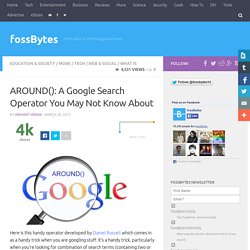
It’s a handy trick, particularly when you’re looking for combination of search terms (containing two or more search keywords) when one dominates the results, but you’re interested in the relationship between two query terms. The AROUND(n) operator (used in uppercase, as shown with n = a number) is an undocumented Google search operator that will help you find documents where the distance between two search terms is around ‘n’.
The higher the number ‘n’ the less is the proximity between the search words. Here’s an example: A research query that says “hot springs” will mostly show search results about geographical hot springs (because these two words are maximized in use together than with separation between them). Knowing What's What and What's Not: The 5 Ws (and 1 "H") of Cyberspace. Ten Steps to Better Web Research. Last fall I published Beyond Google which examines fifteen tools and strategies for getting students to look beyond the first two pages of Google search results.
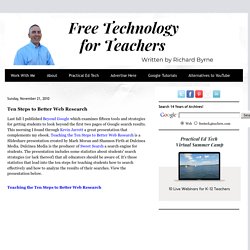
This morning I found through Kevin Jarrett a great presentation that complements my ebook. Teaching the Ten Steps to Better Web Research is a Slideshare presentation created by Mark Moran and Shannon Firth at Dulcinea Media. Dulcinea Media is the producer of Sweet Search a search engine for students. The presentation includes some statistics about students' search strategies (or lack thereof) that all educators should be aware of.
7 Google Search Techniques You Don’t Know Exist. Google search is a powerful tool...sometimes more powerful than you realize!
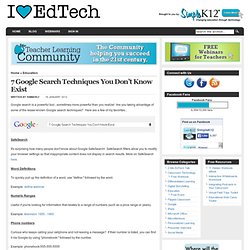
Are you taking advantage of some of the lesser-known Google search techniques? Here are a few of my favorites... SafeSearch It's surprising how many people don't know about Google SafeSearch! SafeSearch filters allow you to modify your browser settings so that inappropriate content does not display in search results. Word Definitions To quickly pull up the definition of a word, use "define:" followed by the word. Example: define:webinar Numeric Ranges Useful if you're looking for information that relates to a range of numbers (such as a price range or years).
Example: television 1950...1960 Phone numbers Curious who keeps calling your cellphone and not leaving a message? Knowing What's What and What's Not: The 5 Ws (and 1 "H") of Cyberspace. 15 Lesson Plans For Making Students Better Online Researchers. Google is usually one of the first places students turn to when tasked with an assignment. Whether it’s for research, real-time results, or just a little digital exploration … it’s important they know how to properly Google.
Lucky for teachers (and students, of course), Google has a handy set of lesson plans that are just waiting to be unleashed upon the leaders of tomorrow. While I understand there’s a LOT more to research than just Googling, it’s important to note that this is where nearly all students start their research. Therefore, it’s a critical skill if they’re going to start down the right paths. Below are 15 lesson plans courtesy of Google designed to make students better online researchers.
Check out the useful Lesson Plan Map too to see how all these lessons fit together and what skills they teach. Beginner Level Pick the best words to use in academic searching, whether students are beginning with a full question or a topic of just a few words. Intermediate Level Advanced Level. Evaluating Web Pages: Techniques to Apply & Questions to Ask.
1.
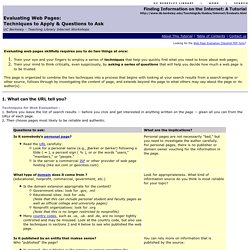
What can the URL tell you? Techniques for Web Evaluation : 1. Before you leave the list of search results -- before you click and get interested in anything written on the page -- glean all you can from the URLs of each page. 2. 2. 1. INSTRUCTIONS for Truncating back a URL: In the top Location Box, delete the end characters of the URL stopping just before each / (leave the slash). Continue this process, one slash (/) at a time, until you reach the first single / which is preceded by the domain name portion. 3. Teaching Students to Effectively Use the Internet. A search engine is essentially a database that points to Web sites and Internet resources.
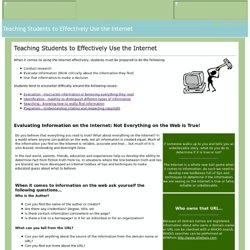
The search engine database is compiled by means of often called spiders, crawlers, or bots. These spiders, crawlers and bots are programmed to find web pages, follow all the links they contain and add any new information they find to the master database. It is important to remember that when you are using a search engine, you are not really searching the entire Internet, but a database of pages and resources from the Internet compiled by the bots.
Once the information has been collected by the robot programs it is turned over to the search engine's indexing program. An helps to establish access points to the information collected by the robot programs and indicates these access points in the database. Search Education – Google. ABCs of Web Literacy: Interactive Tutorial. 10 Google Search Tips All Students Can Use. I'm often asked for recommendations on how to help students use Google more effectively.
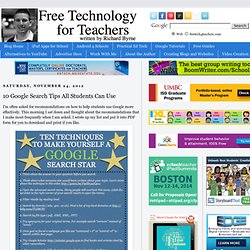
This morning I sat down and thought about the recommendations that I make most frequently when I am asked. I wrote up my list and put it into PDF form for you to download and print if you like. A few things about the PDF. Word Order Matters (1MM #8) Febuary 22, 2013. 16 Searches You Can Run on Wolfram Alpha That Don't Work on Google. Advanced Power Searching.